In South Africa
In 1950, as part of the ANC's Programme of Action the ANC in coordination with the South African Indian Congress, the African People's Organization, and the Communist Party of South Africa, they organized the May Day Strike. It was a one day stay-away on May Day to protest low wages, the banning of Communist leaders and the further plans to ban the Communist party by the South African government. [4]
Stay aways were also used by organizers of the South African insurrection of 1984–1986, with over 40 stay aways used in 1985 and 1986 alone. Between August 1984 and December 1986, four times more political work stoppages were staged than in the entire preceding three and a half decades. [5] In addition to school boycotts, general strikes and guerrilla action taken by the ANC, they made South Africa ungovernable and forced the Apartheid government to gradually reform until it was finally abolished in 1994.
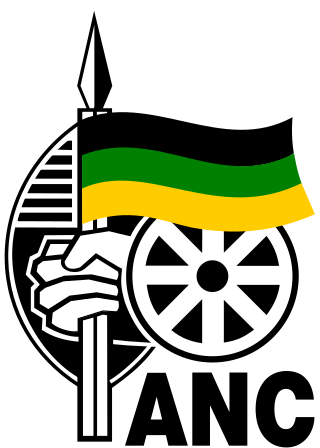
The African National Congress (ANC) is a political party in South Africa. It originated as a liberation movement known for its opposition to apartheid and has governed the country since 1994, when the first post-apartheid election resulted in Nelson Mandela being elected as President of South Africa. Cyril Ramaphosa, the incumbent national President, has served as President of the ANC since 18 December 2017.

The South African Communist Party (SACP) is a communist party in South Africa. It was founded in 1921 as the Communist Party of South Africa (CPSA), tactically dissolved itself in 1950 in the face of being declared illegal by the governing National Party under the Suppression of Communism Act, 1950. The Communist Party was reconstituted underground and re-launched as the SACP in 1953, participating in the struggle to end the apartheid system. It is a member of the ruling Tripartite Alliance alongside the African National Congress and the Congress of South African Trade Unions (COSATU) and through this it influences the South African government. The party's Central Committee is the party's highest decision-making structure.

Albert John Luthuli was a South African anti-apartheid activist, traditional leader, and politician who served as the President-General of the African National Congress from 1952 until his death in 1967.

The Defiance Campaign against Unjust Laws was presented by the African National Congress (ANC) at a conference held in Bloemfontein, South Africa in December 1951. The Campaign had roots in events leading up the conference. The demonstrations, taking place in 1952, were the first "large-scale, multi-racial political mobilization against apartheid laws under a common leadership."

The Congress of South African Trade Unions is a trade union federation in South Africa. It was founded in 1985 and is the largest of the country's three main trade union federations, with 21 affiliated trade unions.
In South Africa under apartheid, and South West Africa, pass laws served as an internal passport system designed to racially segregate the population, restrict movement of individuals, and allocate low-wage migrant labor. Also known as the natives' law, these laws severely restricted the movements of Black South African and other racial groups by confining them to designated areas. Initially applied to African men, attempts to enforce pass laws on women in the 1910s and 1950s sparked significant protests. Pass laws remained a key aspect of the country's apartheid system until their effective termination in 1986. The pass document used to enforce these laws was derogatorily referred to as the dompas.
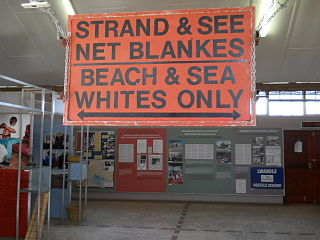
Apartheid was a system of institutionalised racial segregation that existed in South Africa and South West Africa from 1948 to the early 1990s. Apartheid was characterised by an authoritarian political culture based on baasskap, which ensured that South Africa was dominated politically, socially, and economically by the nation's minority white population. In this minoritarian system, there was social stratification, where white citizens had the highest status, followed by Indians and Coloureds, then Black Africans. The economic legacy and social effects of apartheid continue to the present day, particularly inequality.
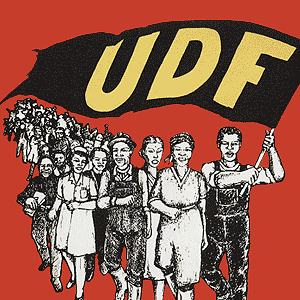
The United Democratic Front (UDF) was a South African popular front that existed from 1983 to 1991. The UDF comprised more than 400 public organizations including trade unions, students' unions, women's and parachurch organizations. The UDF's goal was to establish a "non-racial, united South Africa in which segregation is abolished and in which society is freed from institutional and systematic racism." Its slogan was "UDF Unites, Apartheid Divides." The Front was established in 1983 to oppose the introduction of the Tricameral Parliament by the white-dominated National Party government, and dissolved in 1991 during the early stages of the transition to democracy.
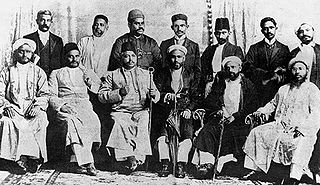
The Natal Indian Congress (NIC) was a political organisation established in 1894 to fight discrimination against Indians in the Natal Colony, and later the Natal Province, of South Africa. Founded by Mahatma Gandhi, it later served an important role in opposing apartheid. It was the oldest affiliate of the South African Indian Congress.
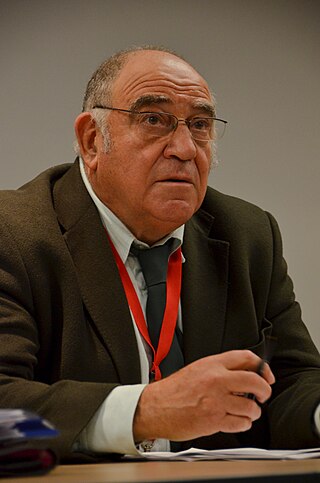
Ronald Kasrils is a South African politician, Marxist revolutionary, guerrilla and military commander. He was Minister for Intelligence Services from 27 April 2004 to 25 September 2008. He was a member of the National Executive Committee (NEC) of the African National Congress (ANC) from 1987 to 2007 as well as a member of the Central Committee of the South African Communist Party (SACP) from December 1986 to 2007.
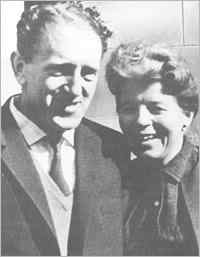
Lionel "Rusty" Bernstein was a Jewish South African anti-apartheid activist and political prisoner. He played a key role in political organizations such as the South African Communist Party (SACP) and the African National Congress (ANC). He helped form the South African Congress of Democrats to bolster white participation in the ANC, and he brought its allies together to establish a Congress of the People, working closely with Nelson Mandela.
Trade unions in South Africa has a history dating back to the 1880s. From the beginning unions could be viewed as a reflection of the racial disunity of the country, with the earliest unions being predominantly for white workers. Through the turbulent years of 1948–1991 trade unions played an important part in developing political and economic resistance, and eventually were one of the driving forces in realising the transition to an inclusive democratic government.

Internal resistance to apartheid in South Africa originated from several independent sectors of South African society and took forms ranging from social movements and passive resistance to guerrilla warfare. Mass action against the ruling National Party (NP) government, coupled with South Africa's growing international isolation and economic sanctions, were instrumental in leading to negotiations to end apartheid, which began formally in 1990 and ended with South Africa's first multiracial elections under a universal franchise in 1994.

The African National Congress (ANC) has been the governing party of the Republic of South Africa since 1994. The ANC was founded on 8 January 1912 in Bloemfontein and is the oldest liberation movement in Africa.
This article covers the history of the Pan Africanist Congress of Azania, once a South African liberation movement and now a minor political party.
The SouthAfrican Mine Workers' Strike was a labour dispute involving mine workers of Witwatersrand in South Africa. It started on 12 August 1946 and lasted approximately a week. The strike was attacked by police and over the week, at least 1,248 workers were wounded and at least 9 killed.

On 2 February 1990, the State President of South Africa F. W. de Klerk delivered a speech at the opening of the 1990 session of the Parliament of South Africa in Cape Town in which he announced sweeping reforms that marked the beginning of the negotiated transition from apartheid to constitutional democracy. The reforms promised in the speech included the unbanning of the African National Congress (ANC) and other anti-apartheid organisations, the release of political prisoners including Nelson Mandela, the end of the state of emergency, and a moratorium on the death penalty.

The apartheid regime in South Africa began in 1948 and lasted until 1994. It involved a system of institutionalized racial segregation and white supremacy, and placed all political power in the hands of a white minority. Opposition to apartheid manifested in a variety of ways, including boycotts, non-violent protests, and armed resistance. Music played a large role in the movement against apartheid within South Africa, as well as in international opposition to apartheid. The impacts of songs opposing apartheid included raising awareness, generating support for the movement against apartheid, building unity within this movement, and "presenting an alternative vision of culture in a future democratic South Africa."

South Africa–Sweden relations refers to the bilateral relations between Sweden and South Africa. Formal relations between the two countries began with the opening of a South African legation in the 1930s with relations being upgraded to ambassadorial level in 1994 following South Africa's first non-racial democratic elections. In 2000 a South African - Swedish Binational Commission was established by President Thabo Mbeki and Prime Minister Göran Persson.
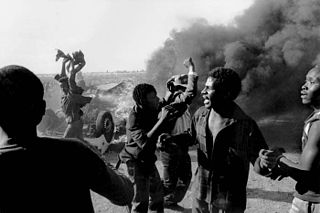
The Vaal uprising was a period of popular revolt in black townships in apartheid South Africa, beginning in the Vaal Triangle on 3 September 1984. Sometimes known as the township revolt and driven both by local grievances and by opposition to apartheid, the uprising lasted two years and affected most regions of the country. The government of P. W. Botha did not succeed in curbing the violence until after it imposed a national state of emergency in June 1986.















